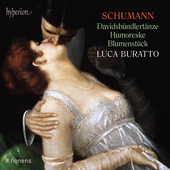

The piano music of Robert Schumann (1810-1856) is relatively easy to play, technically speaking, when compared to Beethoven, Chopin, Liszt, Rachmaninov, Scriabin, to name
but a handful. But when it comes to his descriptive and/or expressive intent, it's a completely different story. I've always found Schumann's writing to be somewhat restrained or even
academic when compared to Brahms or Chopin for example. When Chopin, who lived during the exact same time as Schumann, displayed anger, despair, daring, sadness or melancholy
within his music, it was clearly obvious. With Schumann it's not as easy to capture or define. Even in a work as blatantly emotive as the Davidsbündlertänze, Op. 6
the lines are blurred.
It is known that Schumann divided his creative being into two parts: one as the powerful and fiery Florestan, and the other characterized by the gentle, sensitive nature of
Eusebius. In the 18 Character Pieces that form the Davidsbündlertänze (Dances of David) which, based on letters, are wedding-day feelings set to music, each piece is signed
by one or the other cipher, or a combination of the two. But even then it's not always clear as to which emotion, or outlook, served as a catalyst for each one.
Italian pianist Luca Buratto's approach and interpretation are such that he seems to have found the perfect balance between the two animas and combined them into a single
persona, which may explain the coalescence between the two bipolar extremes. He also brings a graceful clarity to the music by which the key notes are always well delineated and expressed.
Under the wrong hands, Schumann's piano music can often sound pedantic and lifeless, and in some extreme cases even come out as tedious work. Certainly not the case here. The autonomous
and unhurried flow of Buratto's technique first and foremost serves to bring out the music's narrative nature.
In addition to his success at Canada's Honens Piano Competition, Buratto was awarded third prize at the International Robert Schumann Competition (Zwickau) and the special 'Acerbi' prize, awarded
to a distinguished Finalist at Milan's Shura Cherkassky Competition, both in 2012.
Jean-Yves Duperron - July 2017